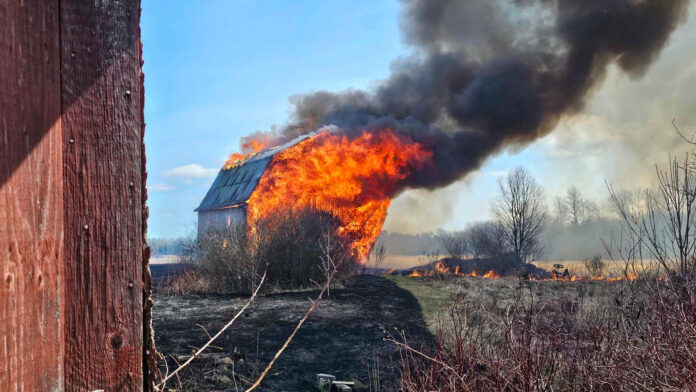CANADA—On April 1, the federal carbon tax surged from $65 per tonne to $80 per tonne, initiating a contentious conversation across Canada. This hike, intended to curb greenhouse gas emissions, particularly targets fossil fuel consumers, affecting various industries and everyday citizens alike.
The hike translates to an additional 3.3 cents per litre for drivers at the pump, affecting not only gasoline but also other fuel sources like propane and natural gas. The impact of this tax increase on individual bank accounts and its purpose in the larger environmental agenda has ignited public interest and concern.
On Manitoulin, Brendan Addison of M’Chigeeng organized a peaceful protest in support of the protests on interprovincial borders and across the country on Monday, April 8.
The protest was held on Goat Island on the North Channel across from the Little Current and the goal, according to Mr. Addison was “to have like-minded people come together to have their voices heard, on the old highway without obstructing traffic.” A protest in Calgary on April 1 saw a collision when five large farm tractors caused a multi-vehicle collision when they refused to stop for police during an attempted traffic stop. The Manitoulin protesters wanted to avoid any safety concerns.
Mr. Addison went on to say that while carbon rebates will increase with the carbon tax hike, that there are hidden costs for citizens that aren’t being addressed by the federal government.
“It’s their (the feds) system and what most people don’t see is the inflation that it (the carbon tax) causes,” he said. “On Manitoulin Island alone, we contribute about $20,000 per day in the winter months to the carbon tax. That number comes from some simple math and is a conservative estimate. Every bit of fuel has to come onto the Island on a truck. A single tanker load, approximately 50,000 litres of diesel fuel, at 21 cents per litre costs $10,500 [in carbon tax. If that whole tanker is taxable, not including HST, of that 10,000 we are now being taxed HST on the fuel itself as well as the additional 10K.”
While the Conservative leadership has decried the carbon tax as a major contributor to the massive climb in inflation in recent years, economists say that it’s not enough to account for the doubling and tripling that we are seeing on grocery store shelves. In 2023, the direct and indirect effects inflated prices by 0.207 percent a year. Nevertheless, critics of the carbon tax aren’t completely off the mark: the gradual increase in carbon tax, slated to climb until 2030, will make up a significant mass of Canadians’ fuel bills.
Mr. Addison alleged that Canada is the only country in the world that is paying a carbon tax, despite having vast swaths of forested lands that offset our carbon emissions. (EDITOR’s NOTE: As of November 1, 2023 there were 39 countries and 33 subnational jurisdictions with a carbon tax, including the European Union Emissions Trading System, United Kingdom, Ireland, Australia, Chile and Sweden.)
Of 195 recognized countries in the world, Canada ranked seventh in a C02 emissions report released in 2016, with a total 675, 918,610 metric tons of gas, contributing 1.89 percent of the global total.
The top two positions are occupied by China and then the United States. The world’s largest per capita CO2 emitters are the major oil producing countries, particularly for those with relatively low population sizes. Most are in the Middle East. However, more populous countries, like the US, Canada and Australia on average have emissions that are nearly three times higher than the global average. Countries with higher standards of living are expected to have higher carbon footprints, however countries across Europe have much lower emissions than North America.
Before the Industrial revolution, emissions were very low and continued to be slow until the mid-20th century, when in the 1950s, the world emitted 6 billions tonnes of CO2. By the 90s this nearly quadrupled to more than 20 billion tonnes. Emissions have continued to climb steadily since then, emitting over 35 billion tons globally each year, with international aviation and international shipping being the biggest culprits.
For those seeking clarity on the implications of this tax, Forbes Advisor Canada offers insights and guidance on understanding the carbon tax rebate, designed to mitigate the financial impact of this escalation.
The carbon tax, initially introduced at $20 per tonne in October 2019, has steadily risen, reaching $80 per tonne on April 1, 2024, with a scheduled increment of $15 per tonne annually until it peaks at $170 per tonne in 2030. This gradual increase aims to prompt Canadians to adopt greener fuel alternatives and contribute to national emission reduction goals.
The tax is applicable in several provinces and territories, including Alberta, Saskatchewan, Manitoba, Ontario, New Brunswick, Nova Scotia, PEI, Newfoundland and Labrador, Yukon, and Nunavut. British Columbia and the Northwest Territories have their own carbon charges, while Quebec employs a cap-and-trade system.
The debate surrounding the carbon tax extends beyond its environmental efficacy to its economic implications. Small businesses, particularly, express apprehension over the disproportionate burden imposed by the tax. The Canadian Federation of Independent Business (CFIB) criticizes the tax hike, emphasizing its adverse effects on small enterprises. CFIB President Dan Kelly highlights concerns about rising prices, stagnant wages and diminished investment capabilities.
Despite the government’s promise of rebates to offset the tax burden, concerns persist about the adequacy and fairness of these measures. CFIB urged Ottawa to address these concerns by freezing the then-upcoming tax hike and promptly returning owed rebates to small businesses and ensuring equitable distribution of carbon tax revenue.
The debate between proponents and critics of the carbon tax underscores broader challenges in navigating environmental policies while balancing economic considerations. As Canada grapples with its commitment to emission reduction targets, the carbon tax remains a focal point of contention and discussion, reflecting the complexities of addressing climate change on both national and individual levels.






